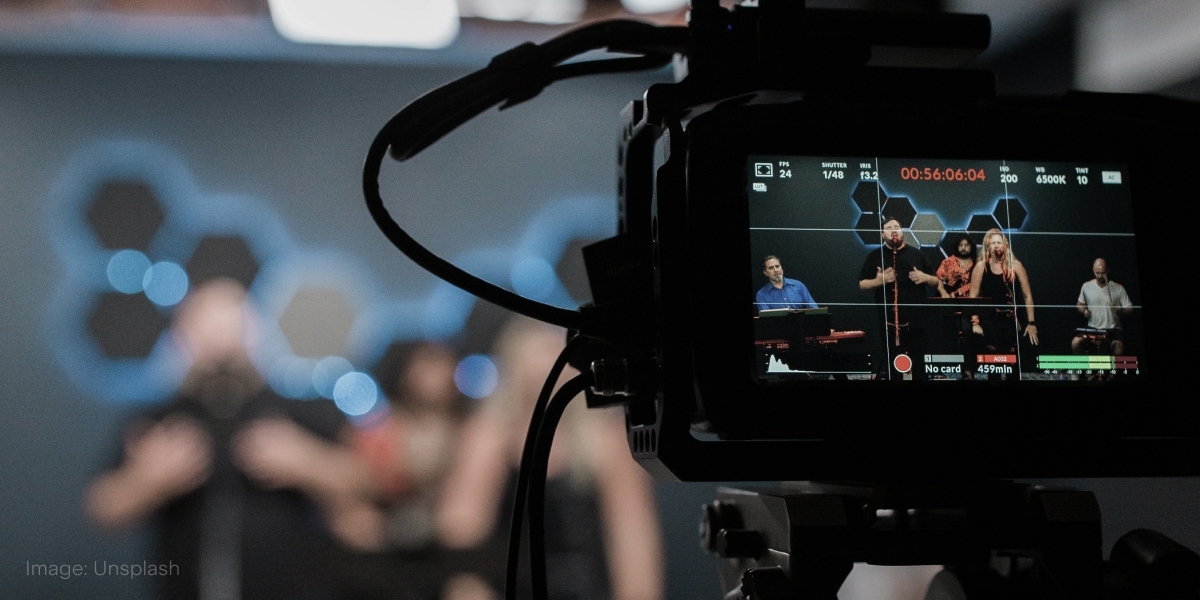
Under the Spotlight AUS: Audinate Group Limited (AD8)
Content creators of today have ready access to the right tools for high-quality audio-visual productions, and it’s partly thanks to firms like the Audinate Group. Let’s put it Under the Spotlight.
.jpg&w=3840&q=100)
The rise of social media and improvements in technology have turned us all into potential content creators. YouTube alone gets about 500 hours of video uploaded every minute. But lifting the standards in audiovisual (AV) production in a mobile world meant overcoming long-standing challenges, such as delivering synchronised sound with pictures and minimising time delays in transmitting data over a network, aka latency.
As recently as the early 2000s, getting a video to its final edit often involved a setup with multiple systems and devices, which weren’t always designed to be used together. Even making music, without the visual part, was more complicated. “I was constantly connecting my synth to a mixer, to a sound card, MIDI cables, all sorts of different connections. To me, it seemed like a networking problem. Why make all those different connections when you could integrate it into a single network?”
Those are the words of Aidan Williams, co-founder and CTO of Audinate ($AD8). His equal passion for music and IT put him in a great position to seek a better technical solution for producing creative content – alongside a small team of engineers bringing expertise in networking systems from their stint at Motorola Research Labs in Sydney.

Sound engineering
They got the project going in 2003 with backing from the National Information and Communications Technology of Australia (NICTA). Now known as CSIRO’s Data61, this is the government research institute that aims to develop technologies that can generate economic, social and environmental benefits for the nation.
The team worked on the foundations of a ‘Digital Audio Network Through Ethernet’, or simply Dante. This would simplify AV setups and provide a user-friendly interface, as well as ensure higher quality content by transferring audio via standard IT networks rather than analog cables.
Co-founder David Myers joined in 2006 when Audinate was spun out as its own company. It became one of NICTA’s success stories. The business soon expanded internationally and entered the U.S. in 2008. High-profile audio engineer Bruce Jackson, another Australian abroad, took interest in Dante when he was vice president at Dolby Laboratories ($DLB). A Dante-equipped device made its debut at a Barbara Streisand show in the same year.
The team continued to refine their hardware and software offerings as part of a network that’s easy to set up and can be connected to other devices. Audinate’s reputation grew and they established themselves as market leaders in the AV space, commonly associated with broadcasting. Live events are still the major revenue driver, despite setbacks brought on by COVID-19. But their products are also installed in various environments such as schools, museums, airports and stadiums.
Their journey to the stock market was more gradual, and $AD8 listed on the ASX in mid-2017 with a market cap of $72.6m.

Production cuts
Audinate customers can select a few products from a suite or use an entire package. In H1 2023, their hardware segment – mainly consisting of chips, cards and modules (CCM) – accounted for 75% of revenues, while software brought in almost 23% of the total. Dante products are used in 3,688 networked AV devices licensed by 559 companies. It has firmly found its niche, being adopted in the market at 12 times the rate of its closest competitor.
However, achieving and maintaining this position has not been straightforward. Growth was stymied with chip shortages in the past two years, which have led to manufacturing delays. The team quickly planned to diversify and design multiple chips to avoid being dependent on particular suppliers. There was also the shift into software: the new Dante Embedded Platform gives users greater flexibility to plug in other devices.
The company is still under pressure to continuously innovate and optimise its operations. Expenses related to R&D accounted for 29% of revenue in H1 2023, with their fast response to the chip issue coming with extra costs. Audinate also aims to reduce operating costs as a percentage of revenues. This would help increase margins, which fell 4.4% in the latest half year while costs only went from 66% to 57%.

Editing events
Audinate has shown marked improvement in H1 2023, with revenues lifting 39.3% to $20.6m, software sales rising 22.4% and CCM sales surging 44.9%. The new Brooklyn 3 audio chip – used in mixing consoles, digital signal processors and amplifiers – has been a key contributor to this trend. As customers have moved onto updated products, the average revenue per unit for CCMs has gone up, despite the total number of unit sales declining due to those supply constraints.
A backlog of orders could prolong the positive trends, but on the other hand, the supply chain risk still lingers. Despite significant sales, Audinate made a net loss of $0.4m after tax in FY 2023. Marketing and sales expenses could escalate again as the team travels and attends trade shows. The key step is to get customers to commit to using Dante in products at an early stage, around 18 to 24 months ahead of their release, to account for manufacturing timelines.
The company claims to have only a 7-8% share of the total addressable audio networking market, being well placed for the future as further digitalisation is expected. Some investors might want to see financial results before echoing optimism. Others might think Audinate’s dominant position is loud and clear.
This does not constitute financial advice nor a recommendation to invest in the securities listed. The information presented is intended to be of a factual nature only. Past performance is not a reliable indicator of future performance. As always, do your own research and consider seeking financial, legal and taxation advice before investing.

Megan is a markets analyst at Stake, with 7 years of experience in the world of investing and a Master’s degree in Business and Economics from The University of Sydney Business School. Megan has extensive knowledge of the UK markets, working as an analyst at ARCH Emerging Markets - a UK investment advisory platform focused on private equity. Previously she also worked as an analyst at Australian robo advisor Stockspot, where she researched ASX listed equities and helped construct the company's portfolios.

